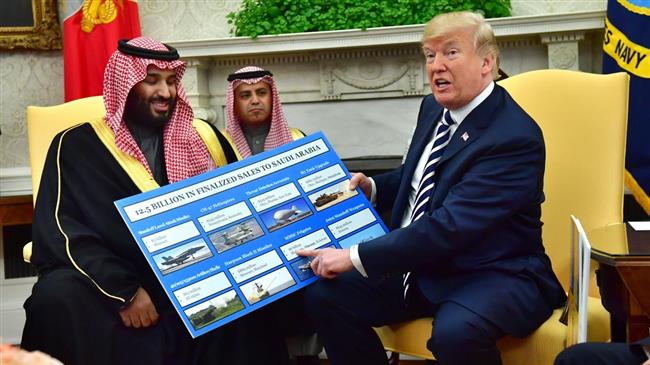US trying to create anti-Iran ‘Arab NATO,’ but divisions persist among PG states


Informed sources say the administration of US President Donald Trump has been quietly pushing ahead with a plan to create a NATO-like security and political alliance between Arab countries to confront Iran despite deep divisions among the Persian Gulf Arab states.
Prior to Trump’s visit to Saudi Arabia last year, reports said President Trump was expected to lay out his vision for what White House officials called an “Arab NATO,” comprised of six Persian Gulf Arab countries, Egypt and Jordan.
The United States would play an organizing and supporting role while staying outside the anti-Iran alliance, the reports added.
On Saturday, American and Arab officials said that the Trump administration hoped to raise the plan at a summit provisionally scheduled in Washington in mid-October.
The White House also confirmed that it was working on the project, tentatively known as the Middle East Strategic Alliance (MESA).
“MESA will serve as a bulwark against Iran,” a spokesperson for the White House’s National Security Council (NSC) said.
Additionally, sources from some of the Arab countries involved in the planned alliance confirmed renewed efforts to activate the initiative.
However, a diplomatic standoff between Qatar and a Saudi-led quartet of countries seems to have already hampered the formation of the so-called “Arab NATO”.
One of the informed sources said the US administration was concerned the Qatar rift could be an obstacle to the Arab alliance plan.
In June 2017, Saudi Arabia, Egypt, Bahrain, and the UAE imposed a land, naval and air blockade on import-dependent Qatar, accusing Doha of supporting terrorism, an allegation strongly denied by Doha.
The Saudi-led bloc presented Qatar with a list of demands and gave it an ultimatum to comply with them or face consequences. Doha, however, refused to meet the demands and stressed that it would not abandon its independent foreign policy.
At that time, Bruce Riedel, a former CIA, Pentagon, and NSC staffer, said the dispute had damaged the prospect for the anti-Iran alliance.
The concept of an “Arab NATO” is now “falling apart,” he said, adding that Riyadh’s aim was actually a “regime change in Qatar”.
“Of course the Saudis may not have the power to force regime change, but that is what they want. Very dangerous period,” he emphasized.
On Thursday, Emirati Minister of State for Foreign Affairs Anwar Gargash expressed his country’s readiness to deploy more troops across the Middle East, saying it could no longer rely on Western allies like the United States and Britain for its security.
He further stressed that the UAE was mainly worried about the increasing differences between the US and Europe on how to deal with Iran.








